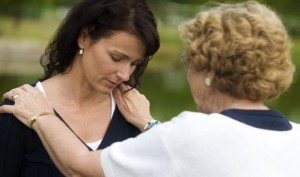
Specific Needs for Women in Treatment

Table of Contents
The actress Katherine Hepburn is credited with the following quote: “Sometimes I wonder if men and women really suit each other. Perhaps they should live next door and just visit now and then.” It makes for a charming punch line, but those who work with men and women who have addiction issues might find the quote more enlightening than humorous. In fact, there is good evidence to suggest that women need addiction care that’s radically different than the type of care provided for men, and women might need to seek out programs that were developed with their specific needs in mind.
The Link to Trauma
Addictions in both men and women can take hold after a catastrophic event. Witnessing a crime, enduring abuse or being victimized in some way can lead to ongoing despair, and substance abuse might seem like an ideal way for the person to forget the trauma and move forward with life. While this can happen to both men and women, research suggests that women are victimized at much higher rates, when compared to men, and they struggle with subsequent addictions more often than men do. This might be because women tend to develop subsequent mental illnesses when they are victimized.
In a study of addicted women published in the Journal of Traumatic Stress, researchers found that of 105 women in treatment for addiction, 59 percent met the criteria for a diagnosis of post-traumatic stress disorder (PTSD). Of those women, 95 percent reported one or more violent traumas. These women had been victimized in some way, and they had developed terrible mental illnesses as a result. This mental illness then led them to addiction. It’s a path too many women tend to follow.
- Terrifying dreams
- Panic attacks
- Constant fear
- Social isolation
Women might also experience a deepening and worsening of addiction symptoms, when compared to women who do not have PTSD. In a study of the issue, published in the journal Addictive Behaviors, researchers found that women who had PTSD were more likely to report a prior suicide attempt, when compared to women who did not have PTSD, and they had higher rates of substance abuse. The addiction and the mental illness seem to go hand in hand here, strengthening one another and making the woman’s life all the harder to deal with.
Difficulties at Home
 Women might also differ from men in that they often live in incredibly difficult circumstances. In a study published in the journal Clinical Psychology Review, researchers found that alcoholic women were more likely to be married to alcoholic partners when compared to alcoholic men. Not surprisingly, the researchers found that being married was associated with alcohol relapse in women, but marriage was protective against relapse in men. When an addiction program is complete, people must return home and learn how to live a sober life while living in communities that once fostered their addictions. If women return to homes in which their partners are still using, relapse might quickly follow. Maintaining sobriety might be too difficult, when faced with almost constant temptation.
Women might also differ from men in that they often live in incredibly difficult circumstances. In a study published in the journal Clinical Psychology Review, researchers found that alcoholic women were more likely to be married to alcoholic partners when compared to alcoholic men. Not surprisingly, the researchers found that being married was associated with alcohol relapse in women, but marriage was protective against relapse in men. When an addiction program is complete, people must return home and learn how to live a sober life while living in communities that once fostered their addictions. If women return to homes in which their partners are still using, relapse might quickly follow. Maintaining sobriety might be too difficult, when faced with almost constant temptation.
Women who live with addicted men might face even more dire consequences. For example, a study in the New England Journal of Medicine found that alcohol abuse and drug use by a woman’s partner were both risk factors for domestic violence. Women who lived with men like this were more likely to be abused than women who did not live with men like this. A woman who goes through rehab on her own, and who is sober upon release, might return home to an abusive partner and endure abuse once more. This might lead her right back into an addiction.
Women who are addicted to drugs might also face economic and social difficulties. As an article in the Journal of Psychoactive Drugs points out, women who have addictions might live in drug-saturated neighborhoods, and they might have few work skills or marketable talents. They might also have poor relationships that were built on a foundation of drugs. These women might also be likely to relapse if they return to their toxic communities when their care is complete.
Work as a Mother
Cultural Roles
In Western society, women have gained some degree of autonomy and they’re allowed to function on an equal footing with men in many ways. On the other hand, gender roles can be incredibly persistent, and these gender roles can also make a woman’s recovery more difficult to maintain. For example, women are often expected to be compliant and obedient, especially when provided with direction from their male partners. Women who live with addicts might feel pressure to give in to offers of drugs and alcohol, as saying no might seem like defiance or disobedience.
Similarly, women might also internalize their feelings about their addictions, and blame themselves for the things that have happened in the past. In a study published in the Journal of Substance Abuse Treatment, researchers found that women in recovery from addiction tended to have very high shame and depression scores, when compared to men. These women might need help to overcome these feelings, and tap into their inner strength and power, in order to overcome the pull of the negative gender role.
Therapy Choices
Programs designed for women tend to provide women with a significant amount of lifestyle help. These programs might link women with community programs that can provide:
- Stable housing
- Parenting classes
- Job training
- Childcare
- Legal advice
The idea is to remove these women from their toxic environments and provide them with a safe and stable place in which to live when treatment is complete. These programs may also assist women in improving their life circumstances. When these women have more money, better prospects and a safe place to live, a relapse might be less likely.
Programs for women might also last for a longer period of time, when compared to programs for men, simply because the risk of relapse is higher in women. Some women benefit from moving to a sober living community when their inpatient work is through, allowing them to learn from other sober women and practice the sobriety skills they learned in formal treatment. This can be a good option for women who simply cannot return home until they’ve had a bit more time in a sober environment.
Women-Only or Mixed?
We Can Help
If you’d like to know more about the rehab process, and how you can find the right program to meet your needs, please contact us at Axis Residential. We provide luxury rehabilitation services for both men and women, and we’d love to speak with you about our programs and our success rates in treating addiction. Please call now to speak with a trained operator, and start the enrollment process.
Further Reading
- Addiction Treatment for Parents
- Advice on Being Successful in an Addiction Recovery Program
- Approaches to Drug Treatment Therapy
- Drug Treatment Program
- Long-Term Drug Treatment Services and Support
- Recovery Centers for Drug Addicts
- Specific Needs for Women in Treatment
- Supporting a Loved One in Drug Treatment
- The Benefits of a Residential Program
- The Complexities of Addiction Treatment
- The Essentials of Dual Diagnosis Addiction Recovery
- Treatment in an Inpatient Setting
- What to Look for in A Facility






